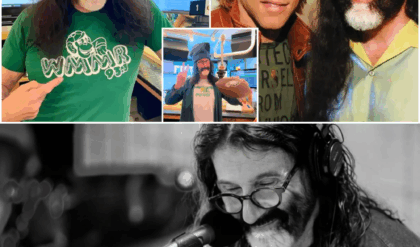:max_bytes(150000):strip_icc():format(webp)/yeun-02-1ed1cb9461d9419b87c9f4fdb6ee14e9.jpg)
Photo: Ben Leuner/AMC
“What? Was the joke that bad?” — Negan, from The Walking Dead comics
A watchtower crumbling in plain sight finally collapses, leaving a community vulnerable to attack by the stupidly stoked mob pounding at the gates. Such was the cliffhanger of last Sunday’s The Walking Dead, and a metaphor for the current state of the show. On Oct. 23, AMC’s never-ending zombie horror serial launched what felt like a never-ending gambit regarding the fate of Glenn (Steven Yeun), a beloved saga fixture. After three episodes of dawdling on resolution and toying with our emotions with shenanigans (the credits were conspicuously scrubbed of Yeun’s name), Glennbiguity was clarified with a solution many saw coming yet strained credulity all the same. Glenn had cheated the reaper. Poorly. The Walking Dead cheated its audience. Weirdly! The unstoppable stalk of certain death has, for over five seasons, imbued the franchise with high-stakes drama, shades of meaning, and pitiless punk cool. Anyone can die. And even though that’s not true – the show is as star-dependent as anything else on TV – it should always feel like it’s true; it shouldn’t kid around with that. Messing with its matrix blows the illusion and sabotages the integrity of the storytelling. Messing with us just really pisses us off. Now: Do we storm the fallen gates and rage away? Or do we forgive and see if The Walking Dead can justify this strange play?
Choke on that cliffhanger, AMC.
Let’s break down Glenn’s Deus Ex Dumpster escape, beginning with the setup in “Thank You” four weeks back. Walkers had cornered Glenn and Nicholas (Michael Traynor), a bumbler panting after redemption. Alas, fear, the mind-killer, got the best of Nicholas. He blew his little lizard brain out and toppled into a mob of zombies. Ever the albatross, he dragged Glenn down with him. Operatic tragedy unfolded, with a dash of necro-erotica. Slow-mo. Maudlin score over silent, ecstatic scream-weeping. Ejaculating entrails. But the shots were framed in such a way that we couldn’t detect the source of the spew. Were the zombies eating on Glenn or Nicholas? The sequence ended with one of those overhead shots that The Walking Dead frequently gives us, a God’s eye gaze at human suffering. A crowding mass of gnashing teeth, lining up to take their bites. This was how the show was going to put an end to Glenn? With sensationalistic nihilism? With a rapacious negation of meaning?
No. That cliffhanger shot echoed (for me, at least) the show’s very first cliffhanger – the end of the pilot, with neo-cowboy hero Rick (Andrew Lincoln) trapped in a tank and walkers chowing on his horse. The young man who helped Rick escape that jam: Glenn. That mirroring should’ve been our first clue that Glenn wasn’t dead. The guts did indeed belong to Nicholas, Glenn’s ironic sacrificial steed. Nicholas had landed in such a way that allowed him to serve as a human buffet shield for Glenn, who scooted away from the gorging scrum and took cover under a dumpster. He remained easily accessible to the revenants clawing and grabbing at him. But they couldn’t get him, and eventually, they gave up and wandered away to hunt for other prey because … well, just because, I guess.
None of this passed the eye test. The scene backfired by shooting for claustrophobic terror – we were in Glenn’s face as he squished under the dumpster, his version of the tank; we were in the eyes of the walkers as they scratched at Glenn – because the presentation argued more for Glenn’s demise than his survival. It also defied or confused our expectations of the show’s zombies. They’ve always been a mercurial, mindless bunch, to be sure, but my expectation based on experience is that they are relentless and reckless in their pursuit of fresh flesh. I don’t understand why they wouldn’t have kept after Glenn or stubbornly waited on him to emerge. Guess these particular zombies don’t dumpster dive. That sure is some dumb luck. Bottom line: Glenn should be dead.
And so it went that after a grueling advent, Christmas came early for Glenn: the feast of Accidental Saint Nicholas brought him an incredible gift of new life. And by “incredible” I mean “Humbug!” You could argue that The Walking Dead played fair by giving us all the information we needed to figure out how Glenn would save himself. But this makes it worse: the unconvincing resolution added to the insult to our intelligence with the injury of anti-climax. As much as we love to play armchair CSI, it can be disappointing when we’re right with a theory. Since the answer was dumb, we don’t even get the consoling reward of being right with a smart theory. Making us wait – with a correct read on the matter on the brain – got us thinking too much about it, growing sick of it or seeing its flaws, and hoping for better.
Add in the upstaging and degrading hijinks — the credit sequence, the evasive statements, the promises of “pretty damn quick” resolution – and the dead Glenn bluff added up to a “JK!” that perhaps only Negan could find fun or funny. He’s a glib and sadistic racketeer and ironic savior from The Walking Dead’s comics who embodies, for me, the franchise’s corrupt, rigged-game approach to character death. He’s reportedly joining the show in the second half of the season, played by Jeffrey Dean Morgan, whose many credits including Watchmen, where he played … a glib and sadistic ironic hero named The Comedian. The show has been foreshadowing his coming, and perhaps the long con with Glenn – in subversive tone and dispiriting effect – can be counted as part of the heralding. Clever. Still hate it. (More on this, later.)
Perhaps the biggest miscalculation The Walking Dead made with this cliffhanger was choosing to be a cliffhanger at all. It was one of many – too many – dangling plot threads “Thank You” left behind, and the show has spent the last three episodes wrapping them up.* If “Thank You” had included Glenn’s grungy escape and let it play out quick and gritty, with more carefully considered blocking and no manipulative framing, the conversation might be different. We’d be talking more about three other on-brand deaths that occurred in the same act – Nicholas, Annie, David – that affirmed the show’s cold-blooded fatalism. We’d be talking about Glenn’s pluck, and we could appreciate better the truth it represents. Sometimes, everything that can go wrong doesn’t go wrong. Bullets miss. Cancer vanishes. And sometimes, Glenns don’t get eaten.
Splashy, risky plays aren’t uncommon this time of year. Historically, November is a sweeps month. ‘Tis the season for bold provocations like Scandal’s strong Christmas-themed abortion episode – also a game-changer for the Olivia-Fitz ‘ship – and sell-out stunts like Empire’s current meta-run-amuck collaboration with Pepsi. Then again, it seems shocker season is now a 365 business in the network-mediated era of call-and-response of hashtag-watching, in which every sudsy beat is a bleatable moment and nights of programming have become Rocky Horror Tweet-Alongs. The competition for buzz is lowering the bar for “we-gotta-talk-about” developments that really need talking about and costing us quality storytelling. I like getting my buttons pushed as much as the next guy. But can we do it more artfully? Outrageousness, fake death, Pepsi – the chase for OMG! is a race to the bottom. The is how Cookie will crumble, people.
The Walking Dead has been on the leading edge of big saga TV and show-audience interactivity. The show is part of a larger Walking Dead content and conversation industrial complex that includes the comic books, a talk show (Talking Dead), convention appearances, and a robust Internet presence. It participates in a larger culture of similar complexes and other trends – binging; after-show Q&As — that is rewiring not just the way we watch TV but encouraging an entitlement to instant clarification that works against certain kinds of storytelling, including the protracted cliffhanger just endured. That’s unfortunate. Still, it’s dangerous business to use every part of the beast – including the credit sequence – to manipulate an audience with coy public relations and perversely impish games, especially in service of bad ideas.
Glennbiguity was a mistake. The good news is that it doesn’t have to be a fatal one. I think most people don’t watch The Walking Dead for the hard-boiled grit, pretentious musings on Big Themes, and who’ll-be-next? death shockers. Not anymore. I think most people watch it because of their emotional attachment to key characters, the outrageous violence (take a shot every time blood splatters on the camera lens), and the near-death. They watch it for the great escape. This one just wasn’t great. From the start, the show’s ambition to be a never-ending zombie survival movie – even in its best form – risked exhausting the audience. After so much bleakness – and after so many brushes with death more harrowing, more “How can they NOT be dead!?” than Glenn’s ludicrous dumpster dodge – I can see someone responding to this fail by saying: “No more.” I’m not advising that. It’s reasonable to expect that the show will learn from the blunder. The trail of breadcrumbs left telegraphing Glenn’s escape might have been crummy, yet it says something that they were left at all. At least the writers recognize an obligation to logic and to the audience. Also take heart in knowing The Walking Dead listens to its audience: we have hope that the writers will note our disappointment.
So why risk it at all? Actually, I have a theory about that. It involves the comics, so SPOILER WARNING.
The Walking Dead is quickly approaching a critical juncture in its loose adaptation of Robert Kirkman’s comics. Previous seasons have winked at it, recent episodes have been foreshadowing it, and the casting news of Negan has encouraged the expectation that some form of it will indeed happen. I say “some form of it” because fake-killing Glenn now makes it unclear if the show will replicate this crossroads moment as presented in the comics. I’ve discussed this with many people who know the comics and the conventional wisdom seems to be that it won’t. It’s possible the Glenn play represented a way to honor a classic moment in the text while signaling that the show intends to go in a different direction. Then again, maybe they’ll go through with it, and the Glenn gambit was a way of charging up this forthcoming beat and prepping us for the blow. This time next year, one of those two scenarios will be true, regardless of the intent now.
So Glennbiguity has injected The Walking Dead with uncertainty. Another benefit: a different conversation. It’s interesting that Glennbiguity transpired as Negan’s casting was announced. While these episodes were shot long ago, the producers would have surely known when the news of their pick would likely break. If Glenn had been alive and present in the narrative over the past few weeks, the questions his presence would have raised might have been trickier for the producers and cast to navigate. Not that they handled the Glenn business all that well. But “When will we know if Glenn is really dead?” is a very different question and more preferable public relations challenge than the alternative.
There’s no avoiding it now. The first half-season is almost over. The second half-season needs promotion. “Countdown to Negan” is surely the marketing hook. Brace yourself. This baddie talks crudely and carries a big barbed stick named Lucille. You don’t want to be hit over the head with it. But perhaps, in a way, you already have.





